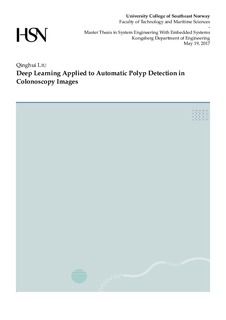| dc.description.abstract | Deep learning is an improvement to the neural network that contains more computational layers that allow for higher levels of abstraction and prediction in the data. So far, it is becoming a leading machine learning tool for general imaging and computer vision. Current trends in research have also demonstrated that deep convolutional neural networks (DCNNs) are very effective in automatically analyzing images. However, the requirement of large number of annotated samples prohibits its wide use in medical image analysis, since collecting and labeling a large amount of data is difficult due to the challenges in obtaining the data from the medical domain.
Polyps are known as possible colorectal cancer precursors, and their early detection is of great importance, but highly challenging from an image processing standpoint. In this work, we evaluate several state-of-the-art machine learning techniques and deep learning methods in the medical image processing domain and research solutions about how they can be more efficiently utilized for automatic detection of polyps in endoscopy and colonoscopy images.
This work proposes an effective transfer learning (TL) framework relying on pretrained DCNNs using a large collection of natural ImageNet images. This has been achieved by evaluating various kinds of cutting edge techniques including both traditional machine learning methods by training feature-based classifiers from scratch and modern DCNNs algorithms with (TL) and fine tuning pre-trained models. We transfer learned ImageNet weights as initial weights, and then fine-tune this model combined with a new deep classifier called fully connected networks (FCNs) with data augmentation and patch-extraction of colonoscopy images to automatically detect polyps. In case of insufficient colonoscopy images, patch-based data augmentation and deep features extracted using TL strategy can provide sufficient and balanced classification information.
With the proposed TL framework with our optimized hyper-parameters, the system achieved overall 96.00% polyp detection precision and sensitivity, which outperformed the traditional machine learning classification methods in each defined performance metric. Moreover, the TL framework proposed is scalable and flexible so that it can easily be extended to include other types of disease detection in the future and also be able to integrate one more DCNNs model to boost its generalizing capabilities. | nb_NO |
